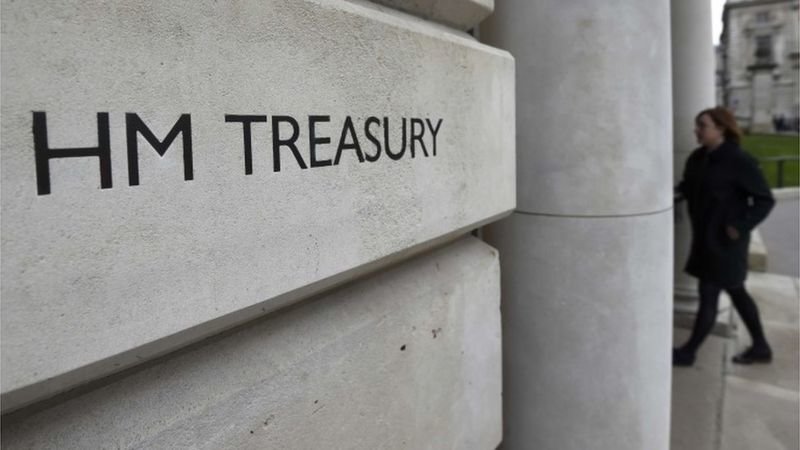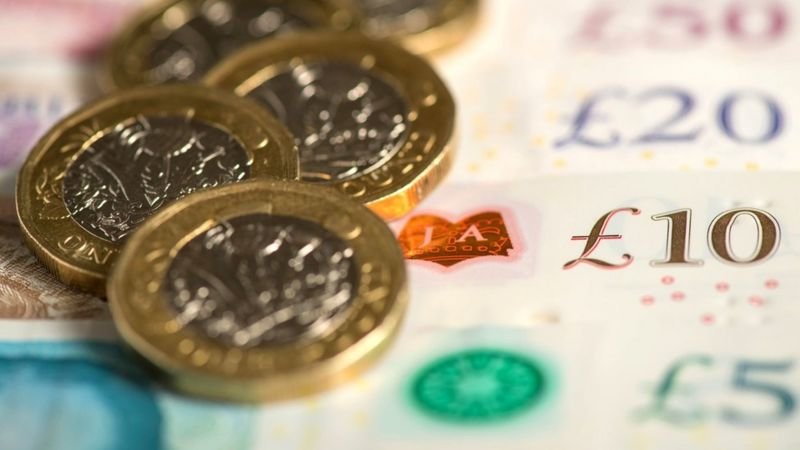
Rishi Sunak's Spending Review: Four things to look out for
This Spending Review - detailing the money government departments will get for things like the NHS, education, roads, and police - only covers the financial year 2021-22. It will also set out money for the devolved administrations Scotland, Wales and Northern Ireland.
In normal times, reviews cover three or four years. But such is the economic uncertainty that this look-ahead has been limited to the next 12 months.
Even so, Mr Sunak will point to the direction of travel for spending (and possibly tax rises) for future years. Few reviews can have been so anticipated. Here's what to watch out for.
1. The difficult financial backdrop
The economic shock has left the UK poorer. By the end of this year the economy is expected to be at least 10% smaller than pre-pandemic.
Alongside the Spending Review, Mr Sunak will disclose latest forecasts for the economy and public finances from the independent Office for Budget Responsibility (OBR).
Earlier this year, the OBR forecast a 13% contraction. While it is not expected to be that bad, the shrinkage will still likely be in the double-digits, and with public borrowing topping £350bn - something not seen in peacetime.
A difficulty for the chancellor is that big tranches of public service spending have already been made. Despite that, some areas will reportedly get more: NHS England, schools and defence. According to the Institute for Fiscal Studies (IFS), some two-thirds of public service spending has been pre-determined.
The key question is whether the remaining third is enough to go round. The answer is almost certainly not. The IFS thinks "unprotected" services such as the courts, prisons or local government are vulnerable to cuts. The overseas aid budget is also in the line of fire.

2. Squeezing public sector pay
Saving, not spending, will dominate Wednesday's agenda. And one of the biggest savings could be a public sector pay freeze. It would be hugely controversial. Media leaks last week claimed Mr Sunak wants a freeze for everyone except frontline NHS staff.
That won't go down well with the police, teachers, civil servants or anyone who thinks they've done their bit to ensure the public sector keeps going in tough times. Even a return to a 1% cap is likely to be fiercely resisted.
Some commentators think the media reports were Treasury kite-flying. Even so, in the summer, Mr Sunak suggested that as private sector pay had taken a huge hit, in the "interest of fairness" the public sector's 5.4 million workers should share some pain.
Trouble is, relative to pay in the private sector, public sector pay has fallen to its lowest level in decades, according to the IFS.
Only during the pandemic has public sector pay performed more strongly than in the private sector. Union leaders have already warned of industrial action to ensure members' pay does not fall further behind.

3. 'Levelling up'
Many promises have been thrown off-course because of the pandemic, and the government will be keen to get its north-south levelling up agenda back on track as soon as possible. Infrastructure spending is key to this.
The north has long complained that the Treasury methodology used to calculate the cost-benefit of spending money on big projects is inherently biased towards London and the rest of the south east. So, expect some changes to these calculations. And watch out for whether any spending promises are new money, or simply projects brought forward.
To underline his commitment to spend on big long-term projects, there is talk that Mr Sunak could publish details of a National Infrastructure Strategy and a Research and Development Strategy.
And in a symbolic move that levelling up is more than a question of infrastructure, the Financial Times has reported that the chancellor could also announce that parts of government could relocate from the capital - with the Treasury leading the way.

4. What happens next?
While Wednesday will be about spending and borrowing, at some point the chancellor will have to decide how it will be paid for. He will start to address this in next March's Budget, although most economic commentators feel the economy will still be too fragile for major tax rises.
It is possible that, with the success of a Covid vaccine, the economy could bounce back, limiting the need for big rises. However, Paul Johnson, director of the IFS, told the BBC that four or five years down the road he still expects the economy to be about 4%-5% smaller than before the pandemic.
Rein in spending and raise taxes too early, and recovery will be choked off. Leave it too late, and the public finances will spin out of control.
"It's a fine judgement," said Mr Johnson. Both the chancellor and Prime Minister Boris Johnson have, however, said they don't want a return to austerity.
There have been reports the Treasury could raise money from changes to Capital Gains Tax, pensions relief or self-employment taxes. But this is tinkering.
Mr Johnson believes £40bn of tax rises are necessary over the short-term, and that sort of money cannot be raised without touching the Big Three: income tax, VAT or national insurance. These bring in almost two-thirds of government revenue.










